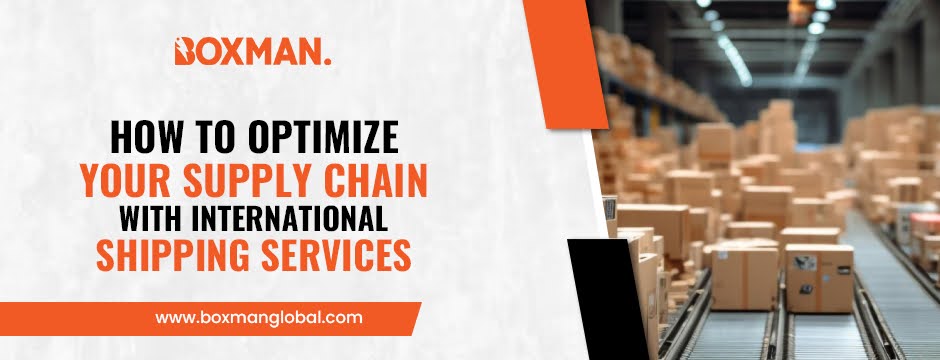
Optimizing your supply chain in today’s globalized economy is critical for maintaining a competitive edge. With businesses increasingly relying on international markets, the role of international shipping companies has never been more vital. Whether you’re a small business expanding your reach or a large corporation seeking efficiency improvements, effectively utilizing international shipping services can significantly enhance your supply chain management. This blog will guide you through key strategies to optimize your supply chain, focusing on cost reduction, improving delivery times, and leveraging the capabilities of international shipping companies, including those based in Dubai.
What is the Role of International Shipping Companies
Global shipping companies are the backbone of global trade, facilitating the movement of goods across borders. These companies offer various services, including freight forwarding, customs clearance, warehousing, and distribution. They are essential for businesses that must move products efficiently and cost-effectively from one part of the world to another.
International shipping companies in Dubai are particularly crucial due to the city’s strategic location as a global trade hub. Dubai's ports and logistics infrastructure make it an ideal gateway for businesses targeting markets in the Middle East, Africa, and Asia.
Strategies for Optimizing Your Supply Chain with International Shipping Services
1. Choose the Right Shipping Partner
The first step in optimizing your supply chain is selecting the right global shipping company. Not all shipping companies are created equal, and your choice can significantly impact your supply chain efficiency.
- Evaluate Service Offerings: Look for a shipping company that offers a comprehensive range of services, including freight forwarding, customs brokerage, and warehousing. This will ensure that all aspects of your supply chain are handled by a single provider, reducing the risk of delays and miscommunication.
- Global Network: Choose a shipping company with a strong global network, especially if your business operates in multiple regions. For instance, international shipping companies in Dubai have a strategic advantage due to their access to key markets in the Middle East and beyond.
- Experience and Expertise: The shipping company's experience handling goods similar to yours is crucial. Whether you’re shipping perishable goods, heavy machinery, or consumer products, the shipping company should have expertise in managing your specific requirements.
- Technology Integration: Opt for shipping partners that offer advanced technology solutions, such as real-time tracking, automated documentation, and data analytics. These tools can provide greater visibility into your supply chain and help you make informed decisions.
2. Optimize Shipping Routes and Modes
Another critical aspect of optimizing your supply chain is selecting the most efficient shipping routes and modes.
- Direct Routes: Whenever possible, choose direct shipping routes to minimize transit times and reduce the risk of delays. This is particularly important for time-sensitive goods.
- Multimodal Transportation: Utilize multimodal transportation, which combines different modes of transport such as sea, air, and land. This approach can reduce costs and improve flexibility in your supply chain. For example, sea and air freight might be the most cost-effective solution for shipping goods from Dubai to North America.
- Regional Hubs: Consider using regional hubs for distribution. For instance, international shipping companies in Dubai can serve as a hub for distributing goods throughout the Middle East and Africa, reducing overall transit times and costs.
3. Leverage Technology for Supply Chain Visibility
In today’s digital age, visibility is vital to supply chain optimization. Advanced technologies offered by international shipping companies can provide real-time insights into your shipments, allowing you to monitor their progress and adjust as needed.
- Real-Time Tracking: Implement real-time tracking systems to monitor the location and status of your shipments. This helps you manage any potential delays or issues that may arise during transit proactively.
- Data Analytics: Use data analytics to identify trends and patterns in your shipping operations. This can help you optimize routes, predict demand, and reduce costs. For instance, analyzing shipping data might reveal that certain routes are consistently delayed, prompting a change in strategy.
- Supply Chain Management Software: Integrate supply chain management software with your shipping partner’s systems. This integration can streamline communication, automate processes, and provide a centralized platform for managing your supply chain.
4. Implement Cost-Saving Measures
Cost reduction is a key goal in supply chain optimization. By working closely with international shipping companies, you can implement various strategies to reduce shipping costs without compromising service quality.
- Consolidate Shipments: Combine smaller shipments into larger ones to take advantage of bulk shipping rates. Consolidation can also reduce the number of shipments and, consequently, the overall shipping costs.
- Negotiate Rates: Regularly review and negotiate shipping rates with your provider. Long-term contracts or high shipping volumes can give you leverage in negotiations.
- Optimize Packaging: Efficient packaging can reduce the size and weight of shipments, leading to lower shipping costs. Work with your shipping partner to ensure your products are packaged most cost-effectively.
- Use Free Trade Zones: If applicable, use free trade zones (FTZs) to reduce duties and taxes. Global shipping companies in Dubai often operate within FTZs, which can provide significant cost savings.
5. Enhance Customs Compliance and Documentation
Customs delays can severely disrupt your supply chain. To avoid these issues, ensure that you fully comply with international trade regulations and that all necessary documentation is in order.
- Partner with a Knowledgeable Broker: Work with a customs broker familiar with the regulations in both your home and destination countries. This can help expedite the customs clearance process.
- Accurate Documentation: Ensure that all shipping documents, including invoices, packing lists, and certificates of origin, are accurate and complete. Any discrepancies can lead to delays at customs.
- Stay Updated on Regulations: International trade regulations are constantly changing. Stay informed about new regulations affecting your shipments and work with your shipping partner to ensure compliance.
6. Plan for Peak Seasons and Demand Fluctuations
Supply chain disruptions often occur during peak seasons or when demand fluctuates unexpectedly. By planning, you can minimize the impact of these fluctuations on your supply chain.
- Forecast Demand: Use historical data and market analysis to forecast demand during peak seasons. This will allow you to adjust your shipping schedules and inventory levels accordingly.
- Reserve Capacity: During peak seasons, shipping capacity can become scarce. Work with your shipping partner to reserve capacity in advance, ensuring your shipments are on time.
- Flexible Shipping Options: Consider using different shipping options depending on the urgency and volume of your shipments. For example, air freight might be necessary for urgent shipments during peak seasons, while sea freight can be used for less time-sensitive goods.
7. Foster Strong Relationships with Shipping Partners

Building strong relationships with international shipping companies can improve service, more favorable rates, and increase flexibility.
- Regular Communication: Maintain regular communication with your shipping partner to stay informed about potential issues, changes in regulations, and new service offerings.
- Collaborative Planning: Work together on strategic planning, especially for large or complex shipments. Your shipping partner’s expertise can help you avoid pitfalls and ensure smooth operations.
- Performance Reviews: Conduct regular performance reviews with your shipping partner to assess their service levels and identify areas for improvement. Use these reviews to discuss concerns and explore new ways to optimize your supply chain.
Conclusion
Optimizing your supply chain with the help of international shipping companies is essential for maintaining competitiveness in today’s global market. Businesses can significantly enhance their supply chain efficiency by carefully selecting the right shipping partner, leveraging technology, implementing cost-saving measures, and planning for demand fluctuations. For those operating in the Middle East, international shipping companies in Dubai offer strategic advantages that can further streamline operations and reduce costs.
By following the strategies outlined in this blog, you can optimize your supply chain, improve delivery times, and reduce costs, ultimately driving greater success in your global operations. Whether you are a small business or a large corporation, effective supply chain management is key to thriving in the increasingly complex world of international trade.
Want to find out more? Visit us at Boxman Global Logistics!